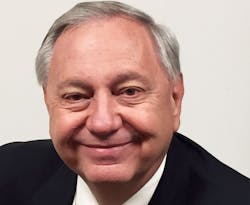Lirel Holt, founder of CARSTAR and current CEO of four companies, has experienced a rich and varied career in the collision repair industry and shows no signs of slowing down. Holt says he was basically born into the industry—he worked his way through college restoring cars and ended up working for a body shop after graduation that grew to over 20 people. Holt’s entrepreneurial skills caught 3M’s attention. The company approached Holt to head up a business division that would teach the industry how to be better at their jobs by using and understanding emerging software. Holt accepted the position and developed and ran the 3M Auto Repair Management Software (ARMS) workshop for six years.
In 1989, Holt tackled a new challenge and founded CARSTAR with the hopes of changing and professionalizing the collision repair industry. Holt was with the company for about nine years, and since then has added a number of accomplishments to his résumé, including working as a founding mentor for the Helzberg Entrepreneurial Mentoring Program and his latest, the MotionU project, an online database that tracks any races, training, shows or other relevant events that anyone in the industry might benefit from or enjoy attending.
With running all of these businesses, Holt still finds time to compete in open road races in a 2009 Dodge Viper. Holt takes a look back on his career and shares his thoughts on the state of the industry today and some of his proudest career moments.
CARSTAR is a huge name in the collision repair industry, why did you decide to retire?
It was my time to pass the baton on. I felt I had taken it as far as I could and I thought there were better leaders waiting to move things forward. I wanted to move on to new things. Currently, I am the CEO of four companies including my love affair, MotionU, which has the goal of tracking all of the automotive events on the planet. So far this year, we’ve tracked 165,000 events. We have events in the U.S., Canada, U.K., Australia and are expanding.
You mentioned that when you ran 3M/ARMs and CARSTAR, you wanted to change and professionalize the collision repair industry. What advice would you give to others who have the same goal?
I think it’s most important to learn. Early on, I went to everything I could to learn new things. It’s the same today and I suggest businesses send people to training or bring teachers in. Knowledge is truly power. It’s an advantage. When I was managing and training at 3M/ARMS and at CARSTAR, too, I emphasized the importance of treating people the way that you would like to be treated. That’s the key to management and sales. Leading by example is also a given. A good leader displays enthusiasm and even joy for his or her work. Good leaders love to work, love to learn and love to solve problems.
Since you started in the industry, what are the biggest changes you’ve seen?
Science—computers, more specifically. New technology has given shops the ability to track, count, and manage all kinds of data. The work environment and tools have also changed. Advances in every type of tool and technology have made efficiency leaps. Shops have to rely less on actual human beings to get certain jobs done. I’ve also noticed that the shops of today are more customer friendly at the front door, but can also tend to feel like a big box store. The image has certainly changed for the better, and I for one am happy to promote distancing our reputation away from certain types of calendars and junkyard dogs.
What is your evaluation of the current state of the collision repair industry?
It is going to go through some more huge changes. The fear of autonomous cars will convince some shops to exit. I think we’re still a long way off from that demand dropping, if it ever does. I am sure that for the foreseeable future, accidents will still occur. Frankly, I think the collision repair industry will be more valuable than ever. I do think that MSOs, consolidators and franchises will be the most secure ways for a shop to move forward. I’ve been saying consolidation is protection for a long time, and I believe it’s still true.
What do you think the biggest issues are going to be for collision repairers in the near future?
The biggest issue facing collision shops in the next 10 years will be employees. Replacing guys with graying hair like mine is tough. I came into the industry with pretty basic cars. The new technicians entering the industry are immediately faced with more complex vehicles. To expect these young entrants to be able to do the job right away is unfair. Millennials are different, too. I think the smart collision repair leaders have to understand the difference between how the generations think, first and foremost. Shops need to be centered on learning. The older technicians are leaving, the new guys and gals need training and education.
Looking back on your career, what have been some of the most rewarding moments?
Running my own body shop at 21 is high on the list. Learning, over time, more about how people work, how they are motivated and how to help those people who want to work was also extremely rewarding. It’s all about people. There are no results without people. The opportunity that I had to teach business for the 3M/ARMs program across North America allowed me to meet the owners and leaders of thousands of collision repair shops. It gave me the opportunity to exchange knowledge. I have an unbelievable appreciation for everyone who has ever worked in the collision repair industry. I was also moved to tears to be named the third honoree in the Eagles Club, which is the collision repair industry’s hall of fame. I was was also named one of the top 25 Movers and Shakers of the 20th Century in the collision repair industry, which was pretty remarkable.

